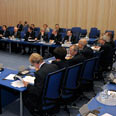
Talks in Vienna
צילום: AP
Iran signals it may not strike nuclear deal
Islamic Republic also refuses to talk to France, blaming country for breaking enriched uranium deal
Iran signaled ahead of international talks Monday that it will not meet Western demands for a deal that would move most of its enriched uranium out of the country and delay its gaining the ability to make a nuclear bomb.
Iran's state-run Press TV cited unnamed officials in Tehran as saying the Islamic Republic was looking to hold on to its low-enriched uranium and buying what it needed for the Tehran reactor abroad. One of the sources said Iran was looking to the US, Russia or France for such supplies.
Such a stance would likely doom the talks, with neither the US or France accepting such terms.
Tehran's refusal to give up most of its enriched stock could also abort chances of a second round of broader negotiations between Tehran and six world powers on the Islamic Republic's nuclear program.
Mohamed ElBaradei, who heads the International Atomic Energy Agency, told reporters after Monday's talks, "We have had this afternoon quite a constructive meeting. We are off to a good start."
The talks Monday attempted to implement what Western officials say Iran agreed to during the Geneva talks; letting a foreign country – most likely Russia – turn most of its low-enriched uranium into higher grades to fuel its small research reactor in Tehran.
Ahead of the talks it remained unclear whether Iran was even ready to discuss shipping out most of its enriched stock.
Press TV reported a further potential glitch as the talks began. Turning to an unnamed source, it cited the source as saying Iran would not negotiate with France at the Vienna talks because Tehran has not received any enriched uranium from France despite owning 10 percent of that nation's Eurodif nuclear plant.
Areva, the state-run French nuclear company, has described Iran as a "sleeping partner" in Eurodif, which Tehran bought into more than three decades ago before the Islamic Revolution bought the clerical leadership to power.
Still, the French were attending the talks and the doors to the closed meeting remained shut more than an hour after they started with no suggestion that the French delegation was planning to leave.
Based on the present Iranian stockpile, the US has estimated that Tehran could produce a nuclear weapon between 2010 and 2015, an assessment that broadly jibes with those from Israel and other nations tracking Tehran's nuclear program.










